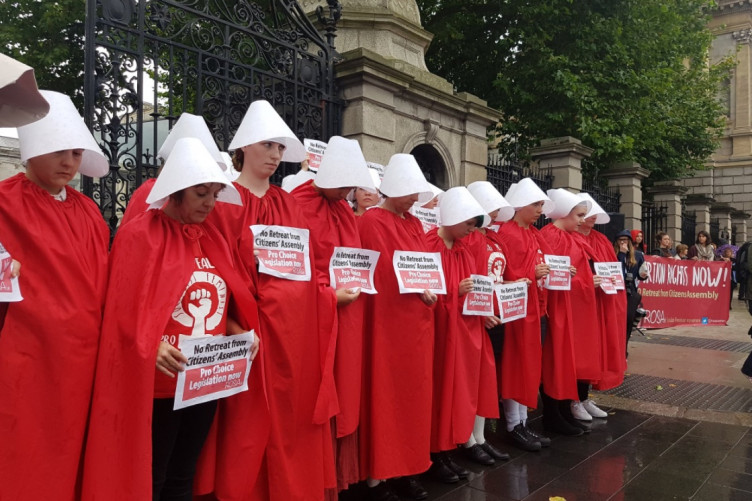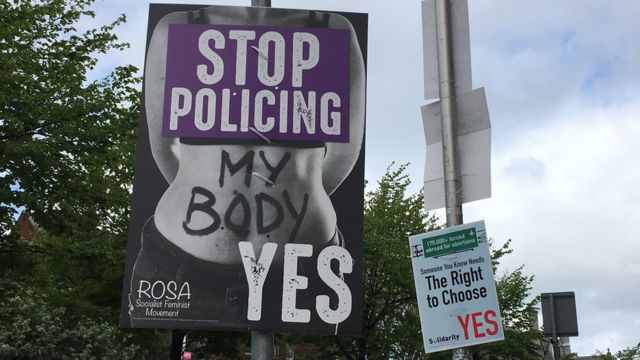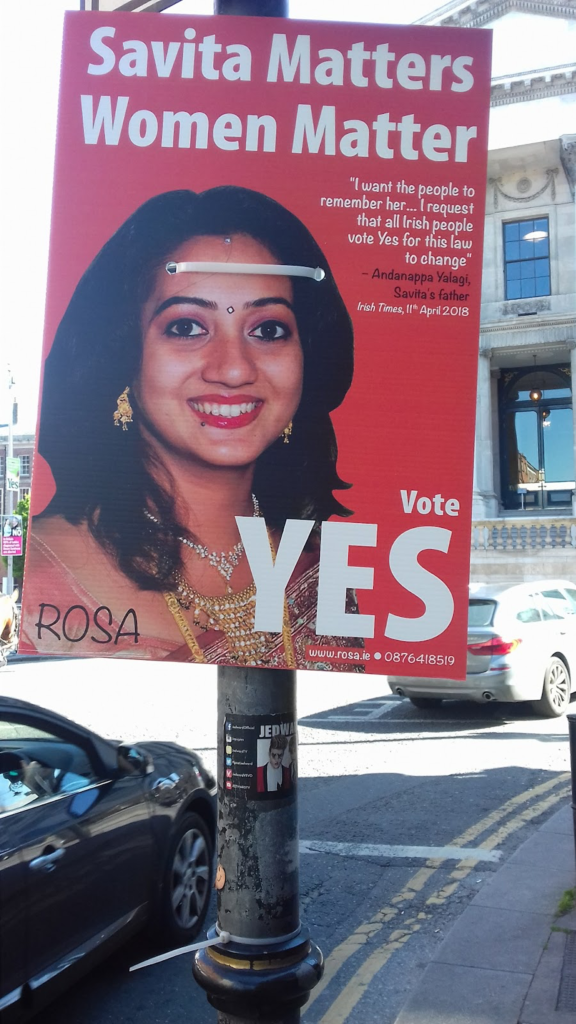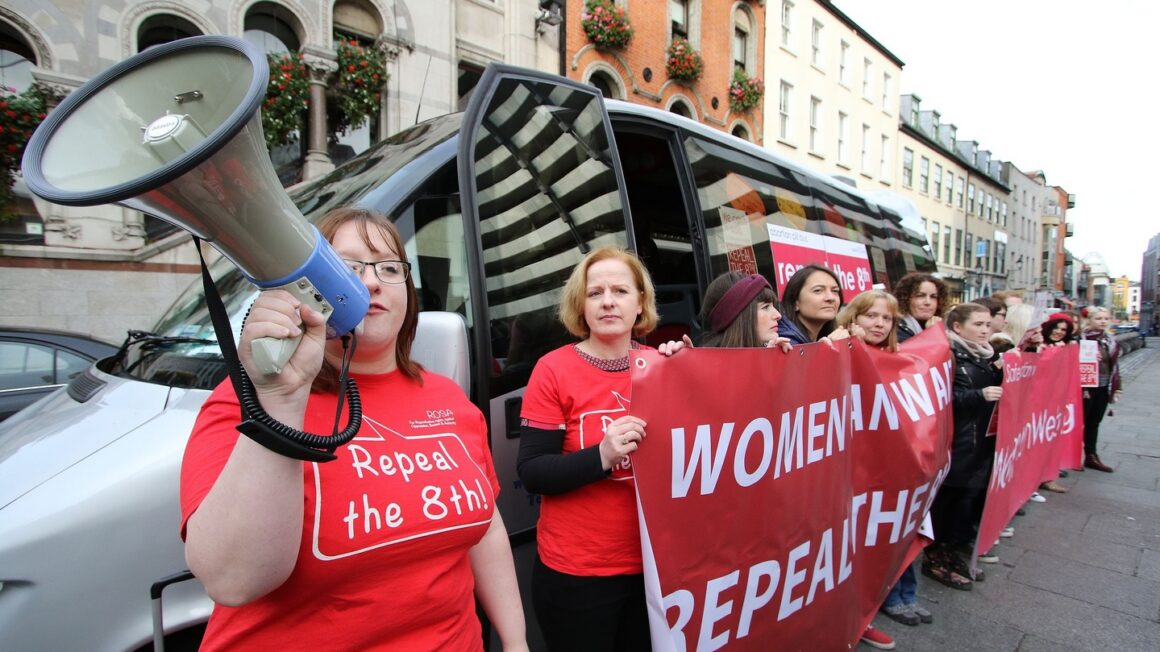On the 5th anniversary of the historic Repeal vote and the winning of abortion rights, Ruth Coppinger (former Socialist Party TD and activist with ROSA) reflects on the campaign, the role of socialist feminists in it and the necessity now to organise against the right-wing backlash against feminist and LGBTQ gains.
When Leo Varadkar delivered his now infamous line about Repeal being a ‘quiet revolution’, he was attempting to rewrite history, to falsify the role of Ireland’s political establishment – which in fact has a particularly inglorious record of misogyny and conservatism – and to minimise the real struggle from below that characterised how abortion rights were won.
His narrative was designed to miseducate as to how change really comes about, namely through popular movements, rather than the benevolence of the establishment. A referendum had to be wrenched from it by a loud and boisterous movement of women, young, LGBTQ and working-class people, over the previous five years in particular.
“If there is no struggle, there is no progress” is a slogan used by ROSA – Socialist Feminist Movement that comes from freed slave and abolitionist fighter Frederick Douglass. The slogan sums up the Repeal movement, but is still necessary to invoke five years on in the context of the attacks on abortion rights internationally.
While the 2010s saw the emergence of a new feminist wave, during which Ireland won marriage equality in 2015 and Repeal in 2018, and in which a ‘green wave’ of abortion rights activism won victories in Argentina, Colombia, South Korea and Mexico by 2020-2, the 2020s is seeing a backlash by the right against feminist and LGBTQ gains: Roe has been overturned in the US, transphobia is being ratcheted up everywhere, and the far right is stirring racism and division. The only way those gains can be defended is by building movements similar to Repeal, and to deepen those movements with socialist feminism and broad working-class solidarity and socialist struggle.
As well as Varadkar’s mendacity, since the victory there has been a consistent erasure of the role played by socialist feminists. It isn’t just that the genuine left has always championed abortion rights and should be thrown a bit of credit, it is that in this particular time and place – Ireland 2012 to 2018 – socialist feminists were uniquely able to have a real impact.
Through correct analysis, tactical decisions and some key election wins, socialist feminists had a foot on the inside and the outside – combining the platform of a seat in the Dáil with the powerful activism of ROSA to push forward Repeal and in particular to force the winning of abortion on request up to 12 weeks.
Nobody else will write our history for us, so on this fifth anniversary of Repeal, this is an important re-writing into the historical record of how socialists played a crucial role in winning this basic human right.
Savita, the spark for Repeal
On 14 November 2012, tragic news broke that would change the course of abortion rights in Ireland. In an interview with Kitty Holland of The Irish Times, Praveen Halappanavar, an Indian man living in Ireland, revealed the horrific experience some weeks earlier that led to the death from sepsis of his 31-year-old wife, Savita, in a Galway hospital. Both Savita and he had asked for an abortion several times while she was having a miscarriage at 15-weeks pregnancy. Praveen’s account of being told this was ‘a Catholic country’, and of watching his young, vibrant wife die slowly in excruciating pain had an unprecedented effect throughout the country.
What had happened was something the Catholic fundamentalists had claimed would never happen when they clamoured for a constitutional ban on abortion in 1983 – a woman had died. Given that migrants account for 40% of maternal deaths, Savita is unlikely to have been the first to die in such an appalling scenario. But what was different was the precise, detailed testimony recounted by her heartbroken husband.
There was also the timing. Moves had begun before Savita’s tragic death to challenge the abortion ban, particularly around the ‘X Case’, of allowing abortion where the pregnant person’s life was at risk, including through threat of suicide. A demonstration for abortion rights had also been called in September, a month before Savita’s death, by young feminist activists in an adhoc new group that had been recently formed in response to highly offensive anti-choice ads by Youth Defence.
This same group (which included a young Socialist Party activist who later co-founded ROSA) called a protest at the Dáil the night that news broke of Savita’s death. I can safely say that in all my years of political activism the feeling of that night will never leave me. The emotion was palpable, the grief and anger was like an electric charge in the air.
From that night, the 8th Amendment constitutional ban was in peril.
I spoke as a then councillor for the Socialist Party. I pointed to the horrors that Savita had been put through because doctors gambled that her health was at risk, but not her life, and therefore doctors feared to act until they deemed she had reached the point of her life being in danger. Were there thresholds of pain through which women would have to go before being deemed eligible for abortion? I recall saying that animals would be treated more humanely. Here are some of my words from that night:
“The X case is absolutely not enough – because it would not have guaranteed that she got the treatment that she needed – we need far, far more. In the X case, the life of the woman is pitted against her health… Are we saying that there’s an acceptable threshold of pain, suffering and torture that we’re willing to put women through before their lives are deemed to be in danger?”
The strongest applause was for separating church and state. It was clear the mood of women, and young people particularly, was – enough!
In the subsequent days and weeks, at marches and meetings, I and others in the Socialist Party pointed out that X Case legislation, increasingly becoming the focus of discussion among abortion rights advocates, would not have helped Savita. There was a reluctance to accept this amongst some in the movement, particularly because they feared that calling for the repeal of the 8th Amendment would require a referendum that would not be passed.
Some also had the illusion that once an abortion law was on the statute books it would essentially open up a chink that could be pushed open and lead to wider abortion on other grounds in the future.
The Irish political establishment, conservative to the core and with a history of deep-seated misogyny and subservience to the Catholic Church since the state’s foundation, moved to shore up the situation and quell the movement.
They had done nothing to vindicate the life of pregnant women for 20 years since the X Case, a harrowing case of a 14 year-old rape victim blocked by the Attorney General from leaving the country for an abortion. That case had led to national outrage and protests too. Now, the government, comprising Fine Gael and Labour, proposed a new law, the Protection of Life During Pregnancy Act 2013 (PLDP). This was to enact abortion for cases where the woman or pregnant person’s life was at risk, including through suicide. But so conservative was this law that it involved a suicidal person having to convince a panel of three doctors! And of course there was a massive chilling effect on those doctors of facing 14 years in jail for any decision deemed to breach the law. The Socialist Party’s TD in the Dáil at the time, Joe Higgins, voted against the law for this reason, despite pressure from some who saw the law as an advance.
The whole Act was to prove useless for anyone suicidal, but it also failed to box off the issue from the establishment’s point of view. This fiasco – of a government bringing in a law off the back of a demand for change after the death of a woman, that actually reasserted the abortion ban and put a 14-year prison sentence clause in the legislation in 2013 – speaks volumes about how struggle should be conducted.
It’s essential that we do not limit our demands, but rather that we demand what’s actually needed. As James Connolly put it: “Don’t be ‘practical’ in politics. To be practical in that sense means that you have schooled yourself to think along the lines, and in the grooves that those who rob you would desire you to think”. In asking for legislation for X, we got nothing at all. It also served to demobilise as it wasn’t an inspiring demand to continue to protest around.
It wasn’t long before multiple cases would be taken to international courts or brought out into the public by women with serious medical diagnoses forced to travel abroad and denied their rights in Ireland. Horrific incidences of migrant rape victims; of pregnant teenagers in care being sectioned; of couples bringing the remains of a fatal fetal abnormality back home from the UK in the boot of their car; all came to light. There was even a case of a clinically dead pregnant woman being kept alive by court order in 2014, whose family had to go to the Supreme Court to have her be allowed to die with dignity – the horrors and shame of Ireland’s abortion ban just wouldn’t go away.
This was to say nothing of course of the daily reality of most abortions being exported: 158,252 with Irish addresses had travelled to the UK for abortions between 1980-2013, and an increasing number were ordering abortion pills online through telemedicine agencies and actually having abortions within the state – in their own homes.
Setting up ROSA
On International Women’s Day, 8 March 2013, ROSA was formally established. Members of the Socialist Party who had been active in the abortion rights movement saw the need for an active, unapologetic, pro-choice organisation to campaign for Repeal. We had seen the change that was taking place in consciousness on abortion through street stalls in city centres and working class areas. But ROSA would have a broader focus as a feminist, anti-austerity and anti-capitalist group, seeking to build the socialist feminist wing of the growing movement. This was also an era of massive austerity following the bank bailout and ROSA was seeking to activate working-class women and women and queer workers hit by the cuts taking place. ROSA was a perfect name to convey the ideals embodied by both Rosa Luxemburg, the Marxist and revolutionary, and Rosa Parks, the Black civil rights champion.
In a newsletter produced by ROSA when it was launched it had a headline calling for repeal. It had become clear that the PLDP Act was defunct as a solution and just another attempt by the establishment to brush reality under the carpet and avoid dealing with the issue of abortion. We now needed to stop working within the constitutional ban and to get rid of it completely. Time to stop the hypocrisy and the exporting of abortion for all reasons.
A socialist feminist in the Dáil
In May 2014 a fortuitous by-election in Dublin West led to the election of a socialist feminist. I won that election as a Socialist Party candidate. The developing housing crisis and the imminent imposition of water charges were key issues in our election campaign. But discussions in the Socialist Party since the death of Savita a year and half previous identified that abortion rights and feminist issues would be a critical feature of our work. We had seen the growing radicalisation that was developing among women internationally, with the prospect of a new feminist and LGBTQI rights wave developing – something borne out spectacularly as the 2010s progressed, from #MeToo, to Ni Una Menos, to trans rights activism.
Raising repeal and abortion rights would be a priority. We lost no time. Over the summer an issue emerged of a migrant teenager who had been raped, discovered she was pregnant while in direct provision, felt suicidal and asked for an abortion – instead she was put through torture and ultimately forced to carry the pregnancy to viability and delivery by caesarean section. In a speech called at a protest over this, I made the point that this was the time to build a movement for Repeal, time to sweep away the control of the church and Ireland of the past:
”Their time was the Magdalene Laundries, the mother and baby homes – this is our time now!”
In September 2014, the first Bill to repeal the 8th Amendment was published in the names of Ruth Coppinger and Joe Higgins TD, backed at a press conference by ROSA and a member of the Abortion Rights Campaign (ARC).
The Bill was an important marker that would lead to parliamentary bills for full Repeal rather than the previous ones seeking to work around the 8th and for fatal foetal abnormality. Those had of course played an important role in highlighting the cruelty and narrowness of the 8th but, as socialist feminists, we wanted to widen the debate to the vast majority of reasons for abortions.
It was the first of hundreds of interventions using the Dáil platform to pressure the conservative establishment and to be the active voice inside the Dáil for the growing Repeal movement outside.
Abortion Pill Train
The month after publishing the Repeal Bill, ROSA carried out a daring action that would have huge resonance both at home and abroad. We had the idea of an Abortion Pill Train to mirror a feminist action in 1971 where members of the Irish Women’s Liberation Movement took a ‘Contraceptive Train’ from Dublin to Belfast and brought back contraception which was illegal in the South.
We chose the date of Savita’s second anniversary (October 2014) to show that two years had passed and nothing had changed regarding the 8th Amendment.
The action took a huge amount of planning. ROSA members and other participating left and feminist activists from Action for Choice, RealProductive Health and People Before Profit ordered abortion pills online in weeks prior through the international doctor-led telemedicine service Women On Web (WOW). We had them delivered to socialists in the North because, at this time, authorities in the South were intercepting abortion pill packages. We then publicly announced that we would travel back with the illegal contraband to Dublin and that a number of us would take the first abortion pill – something WOW was very keen for us to do to highlight the safety of the pills which were being demonised by some.
We were the first activists to ever take abortion pills in front of the eyes of the press, with the images blasted across Irish and international media thereafter. This included me swallowing a mifepristone pill – using my platform as a TD to illustrate to the countless women / pregnant people who needed to know it, that abortion pills ordered via WOW were a safe and viable option. This action was later repeated in abortion rights struggles globally, for example outside the South Korean parliament in their battle for abortion rights, with Korean feminists communicating with ROSA at the time to inform us that we inspired their action, something that we found moving beyond belief.

The Abortion Pill Train was controversial at the time amongst some feminist activists who expressed fears that ROSA was jeopardising the clandestine supply of abortion pills into the country by drawing attention to the underground abortion network. In reality, awareness of the existence and possibility of medical abortion pills was all too limited, certainly not widely known to most working-class women. But the time was now to blow the whole lid open. We also had the support of the main suppliers of the pills, who gave a guarantee they would help if any state crackdown followed – as did we.
Ultimately the action was a massive success. I was interviewed on the Train debating the safety of medical abortion with a former Master of a major maternity hospital.
We collected the pills in Belfast to a fanfare of publicity and without a hitch. The journey back to Dublin was with some trepidation but, again, without any issue and to more publicity on arrival. The Train garnered huge media attention, at home and abroad, spreading awareness about the option of safe medical abortion to those who didn’t know about it and sending a message that the 8th Amendment would be defied and had to go.
Highlighting the pills had huge and multifaceted benefits including:
1. Demystifying abortion: years of anti-choice propaganda took its toll inevitably on large swathes of the population, so illustrating how common and simple early abortion is – in this instance merely an inducement of an early miscarriage that occurs regularly in early pregnancy in any case – was a concrete way to fight anti-choice propaganda.
2. Spreading knowledge and awareness about the ability to access the pills to those who needed them most: those in a crisis pregnancy situation unable to travel due to poverty, immigration status, being in an abusive relationship, or having children or care roles.
3. As an incredibly compelling means to ramp up political pressure: bringing abortion out into the open made the fact at hand far more real. Irish abortions were happening on Irish soil. Women / pregnant people were taking their agency and bodily autonomy into their own hands in a way that could never, ever be stopped. This growing concrete fact on the ground, especially when it was actively and consciously made part of the movement on the streets, created a whole new dynamic in the situation.
4. Abortion pills brought the reality of the most common form of abortion into sharp relief. Before the Abortion Train action, one of the features that ROSA activists frequently discussed was the prevalence of the “deserving” abortion narrative and the stigmatising of all other abortions. Some establishment politicians, for example, were more willing to discuss (the appallingly tragic) cases of Fatal Foetal Abnormalities (FFA) and access to terminations in these instances only, ignoring the cases of abortion for the majority – the reason that the person does not want to be pregnant. Widespread safe, at-home, self-managed abortions with pills made limiting the discussion to the ‘hard-cases’, and implicitly limiting the change being offered, impossible. (In the end, the fact that FFA was not even properly catered for in the legislation brought in post-Repeal speaks to the way in which the abortion pills shifted the focus of the debate).
The action was highly illegal and could have led to people being arrested. However, ROSA estimated that the authorities would not want to arrest people or to draw attention to the state’s misogynistic abortion laws.
This would be the first of many actions by ROSA around the abortion pills over the next three years. Increasing knowledge of the pills and increasing the numbers who would then seek to use them was to later prove to be a game-changing tactic in winning abortion rights on request up to 12 weeks.
The numbers who became aware that abortion was taking place on the island itself and the numbers who would use the pills rose, according to WOW. In research by Dr Abigail Aiken (published in the British Medical
Journal and later referenced in the Dail by the Minister for Health) requests to WOW for abortion pills rose from 548 in 2010 to 1,748 in 2016. More than half of the Irish women surveyed cited publicity around the public events as making them aware of the pills.
It was also the first of ROSA’s collaborations with Women On Web/Women On Waves and Dr Rebecca Gomperts, the pioneering doctor who has provided abortion access to millions of people in countries where it is illegal or dangerous. WOW had actually been looking for Irish activists to take bold actions. When ROSA contacted them they were delighted and only too willing to help the struggle.
Incidentally, Aid Access, which Rebecca Gomperts leads, has become the top provider of abortion pills to the USA since Roe was overturned and a life saver for so many poor, working-class, women of colour and trans people with crisis pregnancies who can’t travel across states in the US.
Abortion Pill Buses
In 2015 Rosa decided to follow the Train action, but this time organising an Abortion Pill Bus that would invite more participation and travel to a number of cities, providing abortion pills to anyone who needed them, defying the 8th Amendment and the Protection of Life During Pregnancy Act, and rallying further support for Repeal.
Women with a crisis pregnancy were invited to come on board when it stopped and have an online consultation with WOW. An arrangement would then be made to quickly get abortion pills to them.
Once again there was the irony of this highly publicised, illegal act happening in full view of the media and Gardai. At one point, Gardai in Galway directed the bus to a parking place in front of St Mary’s Church!
It was both moving and enraging to see women so desperate that they were willing to get on the bus despite media attention and protests by anti-choice bigots.
The Abortion Pill Bus in 2015 got huge international media coverage. A number of journalists came on the bus to report, from Vice News to the Independent.

In 2017, Rosa’s Abortion Pill Bus was also known as the Repeal Bus, as the prospect of a referendum had made seismic advances by then and a Repeal referendum was imminent. The bus took a two-day tour and returned to Dublin on International Women’s Day for what would be one of the most significant days of mobilisations throughout the entire Repeal campaign. The bus arrived back to Dublin city to a buoyant atmosphere at the Central Bank.
At lunchtime, a ‘Strike for Repeal’ had been called by feminist activists, an inspired initiative echoing activists in Poland who had staged a ‘Black Protest’ women’s strike in 60 cities against the dangerous abortion ban there. This was the first time the idea of striking against oppressive laws against women was raised as a tactic and the powerful action gave a glimpse of what could be achieved by a strike action that was actually backed up by the trade union movement. Actions took place in a number of cities. In Dublin, students streamed out of colleges at lunchtime, joined by workers as well, with several thousand converging on O’Connell Bridge where cars and buses ground to a halt for the duration of the protest.
That evening the Coalition to Repeal the 8th Amendment (in which ROSA and the Socialist Party were actively involved) had called a march for Repeal. This was the first really significant march on International Women’s Day in Ireland. About 15,000 took part in a lively march, including school students clearly attending their first protest as they put their own twist on some old slogans!
Repeal was becoming a household slogan, the movement dramatically developing from 2015-17. The annual March for Choice of the Abortion Rights Campaign was growing, attracting 20,000 in 2016 and 40,000 at its height in 2017. The now legendary REPEAL jumpers were being worn everywhere. Repeal logos and murals proliferated. The question, however, became what type of repeal?
The conservative Irish establishment had come under relentless pressure to grant a referendum but it was still promising the most minimal of change – abortion on the grounds of rape and fatal fetal abnormality, with the possibility of even a replacement of the 8th Amendment with a clause prescribing abortion to specific situations in the Constitution. ROSA and myself in the Dail warned the movement about this. ‘Repeal not replace’ became an important demand. We did not want to fight so hard and be granted a referendum that was a poisoned chalice and changed nothing for the overwhelming majority.
Citizens’ Assembly changes the landscape
In 2016, then Taoiseach Enda Kenny had come under intense pressure to grant a referendum. In the February general election I initiated a pledge that if the Anti Austerity Alliance (AAA) and People Before Profit group had sufficient numbers we would move a Repeal Bill within three months of a new government. We did so, and this Bill added to pressure on Fine Gael to act.
But the political establishment in Ireland is so innately conservative that it feared proposing a referendum and itself bringing in abortion. These political parties, particularly Fine Gael and Fianna Fail, which were now in a ‘confidence and supply’ arrangement (with FF supporting the FG government on key issues), had no record of liberal reform and were terrified of having to introduce something as radical as abortion rights.
They instead decided to pass over the issue from the elected parliament to a Citizens’ Assembly. This was a much criticised decision, seen as outsourcing and a delaying tactic, including by the Socialist Party. However, it turned out to be a massive advantage for the Repeal movement!
The Citizens’ Assembly (CA) of 100 people, 99 selected from the electoral register and a chairperson, would go on to shock the establishment by recommending wide and sweeping change – repeal of the 8th Amendment and abortion services on a wide range of grounds including:
- Without any reason having to be given up to 12 weeks
- For severe and fatal foetal abnormality
- For health
- And, most notably, for socio-economic reasons up to 22 weeks!
It was a salutary lesson that when you pass over a difficult issue to ordinary people, giving them accurate information and testimony, then they’ll likely come back with a progressive decision.
The media and establishment went into crisis mode. The CA had set the cat among the pigeons. RTE journalist David Davin Power, reporting on the news from the CA, talked about politicians now having to “water down” the Citizens’ Assembly proposals. It wasn’t the first or last time that middle class, middle aged, male journalists would comment in this way. ‘Tone policing’ of repealers was rife in the media and we called them out on that too, documenting all the times Repeal campaigners were called ‘shrill’ and condemned for arguing for too much.
ROSA and socialist feminists saw the CA recommendations as hugely significant, as proving that ordinary people were, once again, far ahead of the politicians, and it was critical that the entire movement worked to pile the pressure onto the establishment to ensure these recommendations were fully implemented and not to let the politicians slither off the hook. One of the banners ROSA produced said: ‘Abortion rights now! No retreat from the Citizens Assembly.’
We took tactics very seriously and continually looked at ways in which particular information or demands could be utilised to push the reluctant establishment out of its comfort zone. We highlighted, for example, the findings of Amnesty polls that confirmed widespread support for the CA recommendations, something that wasn’t being utilised sufficiently in the repeal campaign.
Oireachtas Committee & winning 12 weeks
A special Oireachtas Committee was proposed by the government to deal with the unexpected outcome of the CA. This would prove to be one of the most watched parliamentary committees ever established. It was humorous seeing the anti-choice TDs and senators panic over tactics and deciding to go for a wrecking or non-engagement stance, not wanting to give the Committee legitimacy or having the confidence to put their position out into the open, but instead argue they were being thwarted and excluded.
The Socialist Party dedicated a full time researcher to support me as a member of the Committee – that’s how much we put into this issue. We had a dual task on the Committee: (1) winning straight Repeal, with no new prohibitive amendment placed in the Constitution, and (2) not allowing the establishment politicians to bury the CA recommendations – but with a particular focus on the 12 weeks on request, which would facilitate nine out ten abortions, according to the British Medical Journal, and which, alongside health and other grounds, would be a massive step forward. It tallied with the promotion of the abortion pills that ROSA had been doing.
The first battle we waged was before the Committee even began its hearings to ensure the agenda wasn’t narrowed and that witnesses would be called that fitted with the pro-choice recommendations of the CA. What was initially proposed by the Chair was very far from that. I make no apologies for alerting people as to what was going on in the private sessions and calling on them to mail the Committee members. Regular video reports and updates from the Committee were a feature of our intervention.
ROSA staged a seminal piece of street theatre to coincide with the first public session of the Committee in September 2017. We invited people to participate. Fully costumed Handmaids (from the novel and TV series then becoming very popular) walked up the streets in silent formations of two and gathered at the Dail in what became iconic images that would be used in media coverage repeatedly.

One of the key witnesses we proposed was Dr Abigail Aiken who came to present her research to the Committee on Irish women who had used Women On Web’s online abortion pill service. This was critical on so many fronts: to show the safety of the pills; to show that two-thirds of users were already mothers, not the stereotype shown by the so-called pro-life camp; and to show the numbers using illegal abortion pills in Ireland were significant, increasing and would not go away – even if a narrow abortion law was introduced. Research on Ireland and illicit use of abortion pills had actually been specially commissioned by WOW to coincide with our second Repeal Bill being moved in autumn 2016 and knowing that parliamentary discussion of Repeal and the abortion laws was imminent
Obviously testimony from medical doctors was hugely important in winning Repeal, as was evidence from the World Health Organisation, and of course personal testimony from those who’d had terminations for medical reasons. However, the issue of abortion pills was cited by members of the Oireachtas Committee and subsequently by ministers as “a game-changer” in voting for the CA recommendation of 12 weeks on request ‘without reason having to be given’.
Politicians and the pills
- Billy Kelleher TD, FF member of the Committee: “Many had entered the hearings opposed to abortion under any circumstances but it became clear abortions were happening in houses across the country… we were consistently reminded how ten Irish women go abroad every day for an abortion and at least three Irish women a day are ordering the abortion pill online”.
- Hildegard Naughton TD, FG member of the Committee: ”There Is no practical way to stop the use of abortion pills in Ireland. That horse has bolted”.
- Minister Regina Doherty, FG: “…we have a problem with women buying illegal abortion pills online and we realise we need to mind those women.”
- Taoiseach Leo Varadkar, FG: “We know that women obtain abortion pills through the post …we cannot continue to export our problems and import our solutions.”
- Minister for Health Simon Harris, FG: “Is it acceptable to any of us that women are once again left in a lonely and scary place, sending off for a pill to be sent through the post instead of being able to access the medical advice and support they need?”
In their end of year newsletter in 2018 Women On Waves wrote of its work in Ireland and its collaboration with us:
“In September of 2017 the media reports that most Fine Geal ministers still believed only a very restrictive abortion law would pass and none of the four big parties supported legalising abortion till 12 weeks.
Abigail Aiken was invited to testify before the Joint Oireachtas Committee on the Eighth Amendment in November 2017. She presented the research about the safety, effectiveness, and acceptability of medication abortion through Women on Web in Ireland, as well as the new research on Irish women’s decision-making when they need to obtain abortion services, and their experiences both with travelling abroad and availing of online telemedicine services at home.
The testimony about the use of abortion pills in Ireland swayed the opinion of all the parliamentarians, even the conservatives. And on December 14 th, 2017 the Oireachtas committee called for abortion to be legal for all women up to 12 weeks.
As Fine Gael minister Regina Doherty stated in December 2017: “I think the state has finally really recognized that we have a problem with women buying illegal abortion pills online and we realise we need to mind those women….”
Many Ministers followed suit and came out in support of the proposed law change.
The referendum took place on May 25, 2018 and 66% of the voters voted YES. It was the largest turn out for a referendum ever.
The role of Women on Web and the published research about the women using the online abortion service has been acknowledged in the media.
Between April 2006, when Women on Web started its telemedical abortion service and January 2019 when abortion was legalised in Ireland, Women on Web has supported more than 10,000 women from Ireland and Northern Ireland to get access to safe abortion pills.”
Winning free abortion up to 12 weeks on request (with more limits placed on access thereafter) was a huge achievement. It involved forcing a huge about-face for the establishment, for Leo Varadkar, Micheal Martin and so many others. It involved sending them on the now infamously cited ‘journey’ they went on from being anti-abortion to pro-choice up to 12 weeks! It was not, of course, what the CA had recommended – the politicians were cowardly and shied away from those pro-choice recommendations, thus there is the continuation of people having to travel, albeit in much reduced numbers, and the barriers that are being highlighted in the current abortion review.
The referendum
In late March 2018, a referendum to repeal the 8th Amendment was formally granted. The years of waiting were over. It had always been the view of ROSA that the real campaign was to get a referendum – once we got it, we had faith in the majority of working-class and young people, and were confident it could be won.
But confidence isn’t complacency and we knew Yes had to be fought for, particularly as international finance would flow to the No side.
The left in general, but ROSA and the Socialist Party in the Dail in particular – who had played such a key role in putting abortion rights on the agenda – were now going to be completely sidelined, excluded from the media debates and official referendum campaign, despite the role we had played in the previous five years.
In an article in The Irish Times (3/3/2018) by Fiach Kelly, outlining tactical issues in the upcoming campaign, I am quoted as saying that the 12 weeks on request needed to be talked about in the course of the campaign: “If we don’t make a strong pro-choice [case] in the referendum, we will have difficulty with the legislation.” This comment was followed by an anonymous ‘critic’ saying “I want to lock her [Ruth Coppinger] in a room for the next couple of months”.
We understood Repeal was key and not everyone agreed with abortion in all circumstances, but if only the ‘hard’ cases were argued for it could be difficult to get the conservative parties to implement 12 weeks legislation after, but also the referendum could be an educational process that moved attitudes forward. That actually proved to be the case in the course of the campaign.
Together For Yes (TFY) was a merger of three groups: the Coalition to Repeal the Eighth Amendment, the National Women’s Council and the Abortion Rights Campaign. This became the main Yes campaign.
TFY was a broad umbrella which, while it included left feminists, also included liberal feminists and members of the government parties who tended towards conservatism. The emphasis was now placed on abortion as “compassionate care” and “healthcare”, rather than as the choice of the person affected for whatever reason. The Minister for Health and government figures were at the launch and became closely linked to TFY.
In the big TV debates, it was invariably a government minister, a TD, or a party leader who had played no role in fighting for Repeal, while those like myself who had moved Repeal bills and actively built the campaign on the ground over five years were consciously excluded. In one prominent prime-time TV debate during the referendum campaign, two men, Simon Harris (who signed a pro-life pledge the first year he got elected) and Peadar Toibin debated each other!
Sinn Fein also took part in big debates, a party which, let’s not forget, didn’t even vote in favour of the 12 weeks on request on the parliamentary committee, but abstained, its excuse being that it hadn’t been party policy. There was nothing preventing SF having it as party policy by 2018, it just didn’t want to stir up its base, was conservative and had done nothing about abortion rights in the north.
In a letter to TFY during the campaign – sent privately of course as we would never risk damaging the campaign in any way – I wrote to express concerns about the central role in the Yes campaign of conservative and capitalist government figures like Simon Harris who was featured calling for Yes, while at the same time embroiled in misogynistic medical cover-ups like the Cervical Check scandal. We also raised the issue of the absence of working-class voices in the campaign.
At other points, we also raised about the demonisation of the abortion pills that was taking place by spokespersons and government figures on the Yes side. Using the pills in illegality was being likened to backstreet abortions as a way to try to swing votes, whereas using abortion pills in connection with a telemedicine service was classed as a safe abortion by the WHO. In fact, the telemedicine abortion pill service was found in Dr Aiken’s research to have stopped pregnant women from taking drastic, lethal measures to end their pregnancies as they couldn’t afford to travel. While the involvement of doctors in the campaign was of course very important, giving too much authority to doctors and too little to the agency of women and all people who can get pregnant, went against fundamental tenets of feminism. These are also the pills that would be the mainstay of the legal abortion service after Repeal.
While unfairly excluded in the media and official campaign, socialist feminists played our own independent role. We held our own press events, one with trade unionists and community activists and another on medical abortion, its prevalence and safety, with Drs, Rebecca Gomperts and Abigail Aiken. Five pregnant people a day were now using the pills.
ROSA – as well as the Socialist Party and Solidarity – put a massive amount of time, energy and finance into winning the referendum. As well as participating in the canvassing in local communities with TFY, ROSA ran its own independent, working-class, socialist and pro-choice campaign.
- Our ‘Time4Choice’ campaign was youthful, and produced thousands of leaflets, raised tens of thousands in cash and had regular street stalls and conversations with thousands of people. We even organised a 10K sponsored walk from Dublin city centre to the airport to symbolise the pregnant people who were forced to travel – 400 participated and we were cheered by residents the length and breath of Dublin’s northside throughout.
- ROSA produced thousands of posters nationally with thought-out slogans about choice, bodily autonomy and against the shaming of women by the forced-birth side. ROSA consciously included trans-inclusive posters at the heart of its campaign. It has to be said that the TFY posters were in very short supply and often anodyne, many simply saying Yes, and in sharp contrast to the brazen, pointed nature of the No posters. ‘Stop shaming women’ was one poster we produced in response to the No side who made women invisible.
- ROSA had a poster showing the extent of abortion, that 1 in 3 has an abortion in their lifetime – ‘give them a choice not a criminal record’

- Another highlighted the Netherlands, a liberal abortion service but with the lowest rate.
- ROSA’s final poster with the image of Savita evoked once again the memory of Savita which the No side was so desperate to erase, and carried the words of her father’s poignant appeal to vote Yes. This was commented on as having a huge impact.
- Solidarity, in which the Socialist Party was an integral part, produced an excellent poster with an image of a plane, the figure for the number of exported abortions and the slogan: ‘Someone you know needs the right to choose’.


- In April, ROSA filled Liberty Hall in Dublin city with a ‘Rally for Equality, Freedom & Choice’ with high-profile speakers and artists. The purpose of this event was to rally increased numbers into activity in the last month of the referendum campaign.

Victory and significance
The referendum was passed by 66.4% to 33.6% with the highest ever turnout in a referendum in Ireland. Only one constituency voted No and, while there was a stronger Yes in urban areas, there was not the fundamental difference between rural and urban that was so prominent in the past. 65% of men and 70% of women voted Yes.
Some of the Yes votes were remarkable: Dublin overall at 75.5% and Stoneybatter at reportedly 92%. Among young people: 87% of under 25s and 90% of young women. The number of young women who voted in the referendum compared to the previous general election in 2016 rose by 94%.
Trans young people and school students were at the forefront of the campaign, with GCN estimating a 91% Yes in the LGBTQ community.
In RTE exit polls on the factors voters considered important to them in voting Yes:
- 84% cited the ‘right to choose’
- 69% health or life of the woman
- 52% pregnancy from rape / incest
This confirmed what socialist feminists in ROSA and the Socialist Party had felt for years leading up to and during the referendum – that pro-choice sentiment was much stronger than was recognised by politicians and even many in the Yes campaign.
ROSA packed out the Project Arts Centre in Temple Bar on the day of the victory, with hundreds who had been the active backbone of our Yes campaign coming to celebrate in solidarity. The jubilation, the emotion was so intense in the venue, it was exhilarating. When my colleague, Laura Fitzgerald, took the microphone and uttered the words, “Today is for Savita!”, spontaneous sobs and tears and cheers burst forth from every inch of the packed room in an unforgettable moment.
No sooner were the results in that establishment politicians began their appropriation of the Yes vote. At Dublin Castle, where the results would be officially announced, politicians now jostled for position on the stage. Leo Varadkar famously announced it had been a ‘quiet revolution’. Others who were late converts to Repeal and had played little or no role now basked in the Repeal glow.
Socialists who had actively fought for abortion rights for five years since the death of Savita, who had moved Repeal Bills and who were instrumental in pressuring for the referendum were written out of the narrative.
It was clear that Repeal was not just about ending the abortion ban, it was about breaking the connection between church and state in Ireland and the influence of the Church over people’s personal lives. It was a verdict on the historic oppression of women which had been a key feature of the misogynistic Irish state. Combined with the vote on marriage equality three years previous, it signalled the direction in which the majority wanted society to go – inclusive, equal and with freedom of choice.
There was massive unfinished business for equality, women’s and LGBTQ rights in Ireland that the Repeal movement of women, young people etc could now push forward. The problem was that the ‘journey’ the establishment politicians said they were on was going to grind to an abrupt halt in the absence of this active movement.
Right-wing anti-feminist backlash, and bodily autonomy struggles today
The 2010s saw a powerful new mass feminist and LGBTQIA wave explode around the world. The death of Savita and the movement it sparked was at the very beginning of this international process, and the Irish abortion victory proved a huge reference point for fearless feminist fighters occupying the streets of Buenos Aires, Seoul and more around the world in the subsequent years. The achievements of the 2010s feminist wave include abortion and trans rights victories; the placing of gender violence via Me Too and Ni Una Menos on the political agenda globally in a deeper way than ever before; and the emergence of the Feminist Strike that illustrated the potent possibilities of putting feminist demands and struggles at the heart of a revitalised and growing labour movement.
All of this is now facing a brutal right-wing backlash. Roe being overturned in the US is the most glaring example. Legal abortion federally was a prized victory of the second wave feminist struggle in the US and it’s gone. Pregnant people’s health and lives are being gambled daily there now with Handmaid’s Tale references becoming all too cliched – the latest of which is a new proposal in Alabama to prosecute women who have abortions, or miscarriages should the state deem the latter to be their ‘fault’, with murder.
The capitalist system is in the midst of a multifaceted crisis, the depth and complexity of which it’s never faced before – and the anti-feminist, anti-trans backlash is coming straight out of this system in decay. Obscene wealth inequality and the rise of the far-right wrack the system – meaning that never before has it been more obvious how the struggle to really win bodily autonomy for all has to be an anti-capitalist and socialist struggle.
The right-wing forces are engaged in a concerted backlash against the feminist and LGBTQ wave that emerged globally in the past decade in an attempt to crush our anti-oppression struggles and the hope that they bring, but also because the gender binary and backward gender roles are needed by the capitalist system – including via the patriarchal family structure and its role in reproducing the labour force for capitalism.
Getting active to assert the right to control your own body – a most rudimentary right, and yet something denied to so many hundreds of millions of women and trans people around the world – is an act imbued with resistance to oppression.
Ensuring that this vital assertion of one’s humanity becomes unstoppable necessitates organising socialist feminist resistance and struggle, linking with all the exploited and oppressed in a working-class challenge to the capitalist system. Just when the anti-feminist backlash so bleakly emerged, events exploded in Iran that symbolised a new and higher plane had been reached in the feminist wave beginning in the 2010s. The ‘Woman, Life, Freedom!’ movement has seen a revolutionary feminism emerge in Iran. Let’s spread this revolutionary feminism in the 2020s, and fight to imbue it with anti-capitalism and socialism so we can win freedom and bodily autonomy for all.
On the fifth anniversary of Repeal, I’m still awe-struck and inspired by what this youthful, creative, passionate and caring movement achieved when it went head to head with the conservative, misogynistic political establishment. And as we look at developments in Ireland and internationally, most of all the far-right threat, it’s clear that we need socialist feminist struggle, organisation and an alternative more than ever to win lasting, deep-rooted equality and change.












